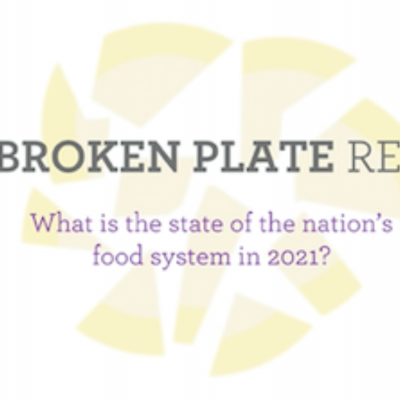The latest Broken Plate Report, the third in the series, from The Food Foundation shows the state of our current food system and the huge challenges we face in ensuring that everyone in the UK can afford and access a healthy and sustainable diet.
The report uses ten metrics to provide a powerful picture of the current UK food system and the lack of progress made to improve food security, obesity levels and sustainability.
The Broken Plate Report is published ahead of the National Food Strategy led by Henry Dimbleby, which is expected to contain strong and urgent recommendations to government. It clearly shows that we need Government and policy makers to regulate for structural changes if we are going to improve the UK’s food environment and transition diets towards more healthy and sustainable outcomes.
Eating Better contributed to this year’s report with findings from the 2021 Ready Meals Snapshot, which found modest progress on the affordability and accessibility of healthy ready meals with vegetarian and plant-based meals becoming the fastest growing category. The report also found a marked decline in cheese as an ingredient in vegetarian options, an important step toward more healthy and climate-friendly diets.

Highlight statistics from the 10 key metrics
Advertising: Advertising spend on fruit and vegetables remains very low, with just 2.5% of total food and soft drink advertising spend going towards fruit and vegetables. This figure fell in 2020 compared to 2019.
The affordability of a healthy diet: The poorest fifth of UK households would need to spend 40% of their disposable income on food to meet Eatwell Guide costs. This compares to just 7% for the richest fifth.
The cost of food: More healthy foods are nearly three times as expensive as less healthy foods calorie for calorie.
Places to buy food: 1 in 4 places to buy food are fast food outlets. The least deprived fifth of local authorities have 20% of places to buy food that are defined as fast food outlets compared with 30% in the most deprived fifth of local authorities.
Sugar in children’s food: 96% of yogurts and 92% of cereals marketed towards children contain high or medium levels of sugar
Wages: In 2020, 25% of workers in the food sector earned the minimum wage or below compared to 11% of workers across the UK.
Veg in ready meals: Around a fifth (22%) of ready meals are vegetarian or plant-based, with a welcome recent drop in price for vegetarian and plant-based meals.

Weight: Children in the most deprived fifth of households are almost twice as likely to have obesity as those in the least deprived quintile by age 4-6.
Height: Children in the UK at age 5 are on average shorter than children in other comparable high income countries.
Anna Taylor, Executive Director at the Food Foundation said: “With the National Food Strategy just around the corner and the task of rebuilding post pandemic now underway, there has never been a more opportune time for the government and businesses to face the challenge of fixing our food environment head on. Bold action will be required if we are to safeguard the future health of our children - but is by no means impossible. This year’s Broken Plate report highlights that our current food environment is failing to deliver diets that are just, healthy or sustainable with this having very real health implications for millions of citizens.”
Simon Billing, Executive Director at Eating Better said: "We need to create a food environment where everyone has a better chance to eat more veg, more often, as currently we’re not eating anywhere near enough, with all the health implications that brings. As we see from our Ready Meals survey, there is some progress on upping veg content, but there is much more work to do on making healthier and sustainable food mainstream and affordable for all."
